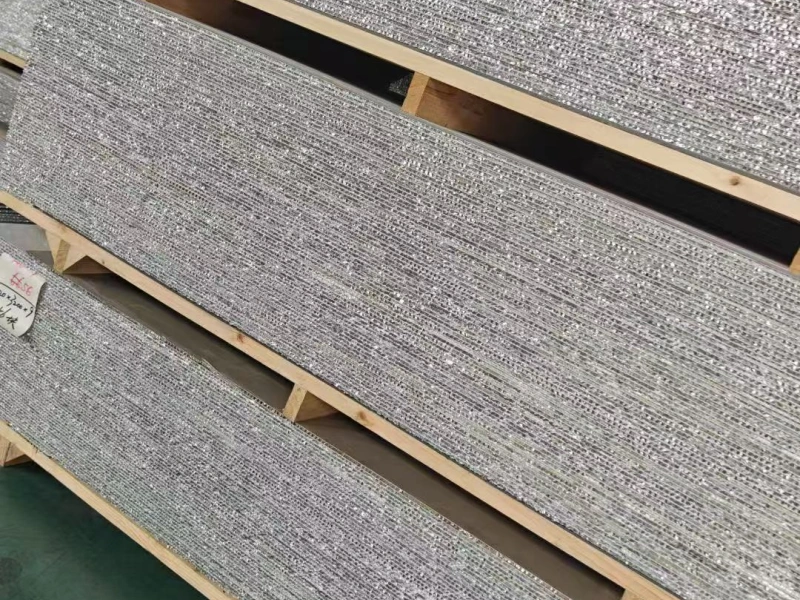Unpacking the Incredible Strength of Lightweight Honeycomb Aluminum
When you hear “honeycomb,” you might think of beehives. But in the world of advanced materials, honeycomb aluminum refers to a highly engineered product known for its surprising strength. Many people wonder: “How strong is honeycomb aluminum?” The answer is, surprisingly strong, especially for how light it is. This unique material combines lightness with incredible rigidity, making it a favorite in industries where performance is key.




An aluminum honeycomb panel is not a solid block of metal. Instead, it’s a “sandwich” or composite panel made with two thin aluminum sheets (called skins) bonded to a core that looks like a honeycomb. This smart design is the secret to its impressive strength. Let’s dive into what makes this material so robust.
The Design Behind Honeycomb Aluminum Strength
The strength of honeycomb aluminum comes from its clever layered construction. Each part plays a vital role:
- Face Skins: These are the outer layers, usually made from high-strength aluminum alloys. They are thin but strong, taking the main forces of bending and stretching. The quality and thickness of these skins greatly influence the overall strength of the aluminum honeycomb panel.
- Honeycomb Core: This is the heart of the panel. It’s an array of hexagonal cells, much like a real honeycomb. Made from thin aluminum foils, this core creates a vast number of small, interconnected tubes. This structure is what gives the panel its exceptional rigidity and resistance to crushing.
- Adhesive: A high-performance adhesive bonds the skins to the honeycomb core. This bond must be extremely strong to ensure that the entire panel acts as a single, unified structure. If the bond is weak, the panel won’t perform as expected.
When these parts are bonded together, the forces applied to the panel are spread out across the honeycomb core. This prevents the thin outer skins from buckling, allowing them to carry much greater loads than they could alone. This is the magic of the sandwich panel design.
Different Kinds of Strength in Honeycomb Aluminum
When we talk about “strength,” it’s not just one thing. Honeycomb aluminum excels in several areas:
- Exceptional Strength-to-Weight Ratio: This is perhaps its most famous quality. An aluminum honeycomb panel can be as strong as a solid piece of material, but only a fraction of its weight. This is crucial for applications where every pound matters, like in aerospace or vehicles.
- High Rigidity and Stiffness: The honeycomb core provides continuous support to the face skins, making the panel incredibly stiff. This means it resists bending and flexing, even over large spans, much better than a solid sheet of aluminum of the same weight. This structural rigidity is key for flat surfaces.
- Excellent Flatness: Because of its high stiffness, honeycomb aluminum panels remain incredibly flat. This is not just an aesthetic benefit; it contributes to the panel’s structural integrity and ability to distribute loads evenly.
- Impact Resistance: The honeycomb cells can deform and absorb energy when hit, which helps to dissipate the force of an impact. This makes the panel more resistant to damage from unexpected forces.
- Shear Strength: The core provides strong resistance to forces that try to slide one part of the panel past another (shear forces). This is important for maintaining the panel’s overall integrity under stress.
- Fatigue Resistance: Thanks to the uniform distribution of stress within the honeycomb structure, these panels can withstand repeated cycles of loading and unloading without developing cracks as easily as some other materials.
What Makes Honeycomb Aluminum Stronger? Key Factors
The overall strength of an aluminum honeycomb panel isn’t fixed. It depends on several key design and manufacturing choices:
- Panel Thickness: Generally, a thicker honeycomb aluminum panel will be stronger and more rigid. More space between the face skins allows the honeycomb core to work more effectively.
- Face Skin Thickness and Material: Thicker aluminum skins (e.g., 1.0mm vs. 0.5mm) provide more material to resist bending forces, increasing the panel’s overall strength. The type of aluminum alloy also matters; for example, 5052 alloy is stronger and more corrosion-resistant than 3003 alloy.
- Core Cell Size and Foil Thickness: Smaller honeycomb cells and thicker aluminum foils used to make the core result in a denser and stronger core. A denser core offers more support to the skins, enhancing the panel’s resistance to compression and shear.
- Adhesive Quality and Application: The bond between the skins and the core is critical. A high-quality, evenly applied adhesive ensures that the panel acts as a single, robust unit, transferring stress efficiently.
- Manufacturing Quality: Precise manufacturing processes ensure the core is perfectly aligned and the bonding is uniform. Any defects can compromise the panel’s strength.
How Different Specifications Affect Strength
Here’s a look at how varying specifications can influence the strength characteristics of an aluminum honeycomb panel:
| Specification | Example Values | Impact on Strength (General Trend) |
|---|---|---|
| Panel Thickness | 10mm vs. 25mm | Thicker panels are significantly more rigid and resistant to bending. |
| Face Skin Thickness | 0.5mm vs. 1.0mm | Thicker skins increase bending strength and impact resistance. |
| Aluminum Alloy (Skins) | 3003 vs. 5052 | 5052 alloy skins offer higher tensile strength and fatigue resistance. |
| Core Cell Size | 6.0mm vs. 12.0mm | Smaller cell sizes (e.g., 6mm) provide greater compressive and shear strength to the core. |
| Core Foil Thickness | 0.05mm vs. 0.08mm | Thicker core foils increase the core’s strength and overall panel rigidity. |
| Surface Finish | PVDF vs. PE Coated | Coatings primarily affect durability and aesthetics, not core structural strength. |
| Bonding Adhesive | Standard vs. High-Performance | High-performance adhesives ensure superior shear strength and delamination resistance. |
Note: These are general trends. Actual strength values are determined by specific product testing and engineering calculations.
Where This Strength Matters: Applications of Honeycomb Aluminum
The unique combination of high strength and low weight makes honeycomb aluminum panels invaluable in many industries. Their structural integrity allows for innovative designs and improved performance.
- Aerospace: The most demanding industry for lightweight strength. Aluminum honeycomb is used in aircraft floors, interior panels, galleys, and even some structural components where weight reduction directly impacts fuel efficiency and payload capacity.
- Marine: Used in shipbuilding for bulkheads, decks, and interior panels of yachts and ferries. Its strength-to-weight ratio and corrosion resistance are highly beneficial in a harsh marine environment.
- Architecture and Construction: For building facades, exterior cladding, interior wall panels, ceilings, and flooring. It allows for large, flat, rigid panels that are lighter and easier to install than solid materials, offering great structural panel solutions.
- Railway and Automotive: In trains, buses, and high-performance cars, honeycomb aluminum is used for floors, doors, and interior parts to reduce overall vehicle weight, leading to better fuel economy and performance.
- Cleanrooms and Laboratories: The panels provide extremely flat, rigid, and easily cleanable surfaces ideal for controlled environments where sterility and stability are paramount.
- Display and Signage: For large-format graphic displays and rigid signs where flatness and durability are needed without excessive weight.
- Furniture: For modern, lightweight furniture designs, particularly large tabletops and panels that require stiffness without being heavy.
Conclusion
So, how strong is honeycomb aluminum? It is exceptionally strong, especially when considering its remarkably low weight. This composite material achieves its impressive structural strength through a brilliant design that leverages the natural rigidity of the honeycomb pattern combined with robust aluminum skins and a strong adhesive.
By carefully selecting the panel thickness, skin gauge, and core specifications, engineers can tailor the strength of an aluminum honeycomb panel to meet the exact demands of any project. This makes it a go-to material for critical applications where a lightweight panel with high rigidity, impact resistance, and flatness is required, proving that smart design can deliver extraordinary performance.
